Unit 5 Section A (Grammar Focus-3c) 课件+音频(人教新目标七年级上Unit 5 Do you have a soccer ball
文档属性
| 名称 | Unit 5 Section A (Grammar Focus-3c) 课件+音频(人教新目标七年级上Unit 5 Do you have a soccer ball |  | |
| 格式 | pptx | ||
| 文件大小 | 2.6MB | ||
| 资源类型 | 试卷 | ||
| 版本资源 | 人教新目标(Go for it)版 | ||
| 科目 | 英语 | ||
| 更新时间 | 2023-10-16 23:08:13 | ||
图片预览

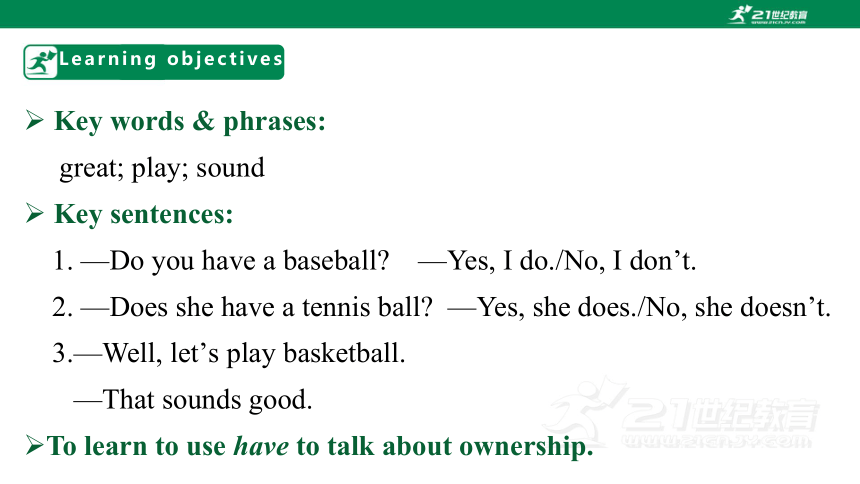
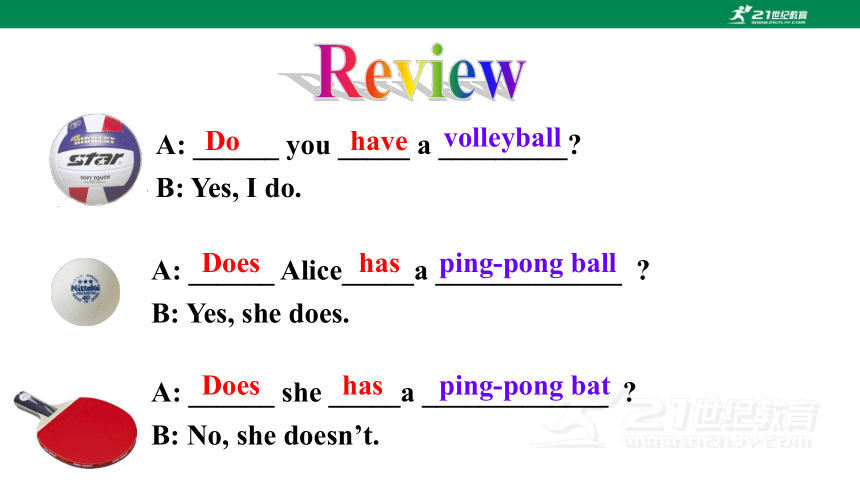
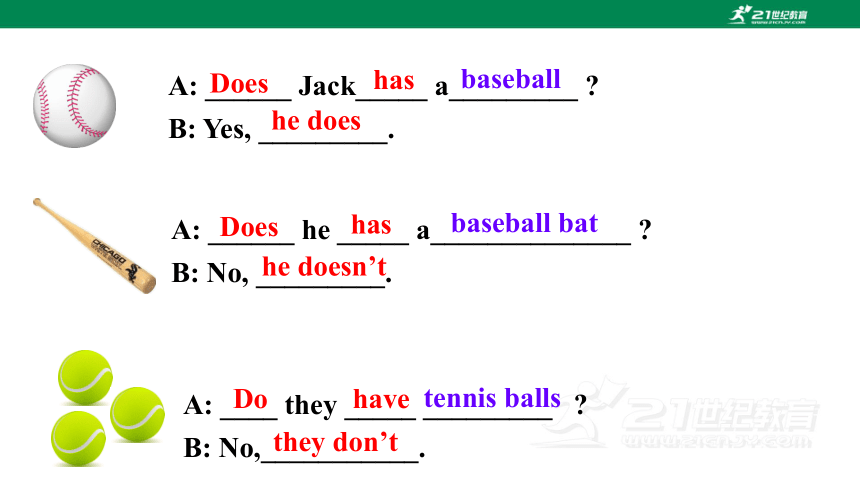
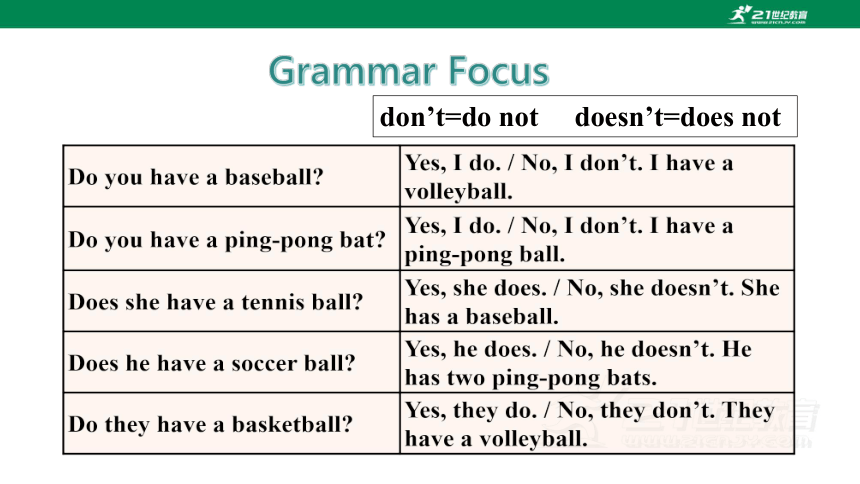
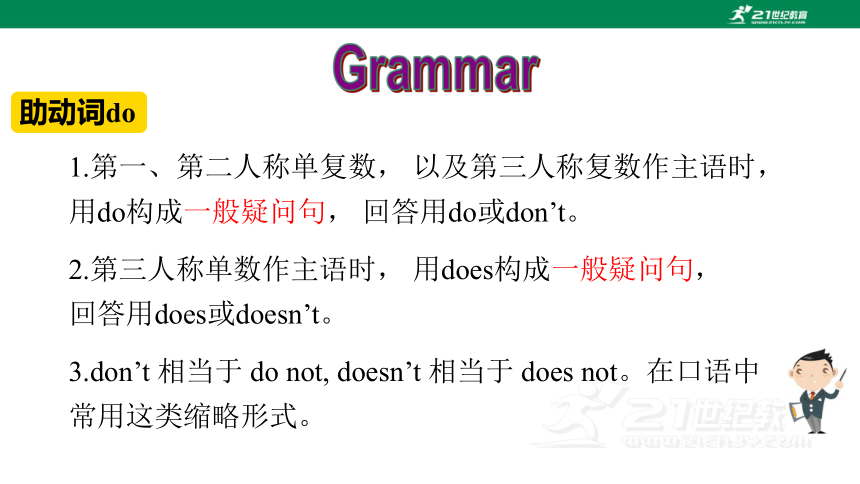
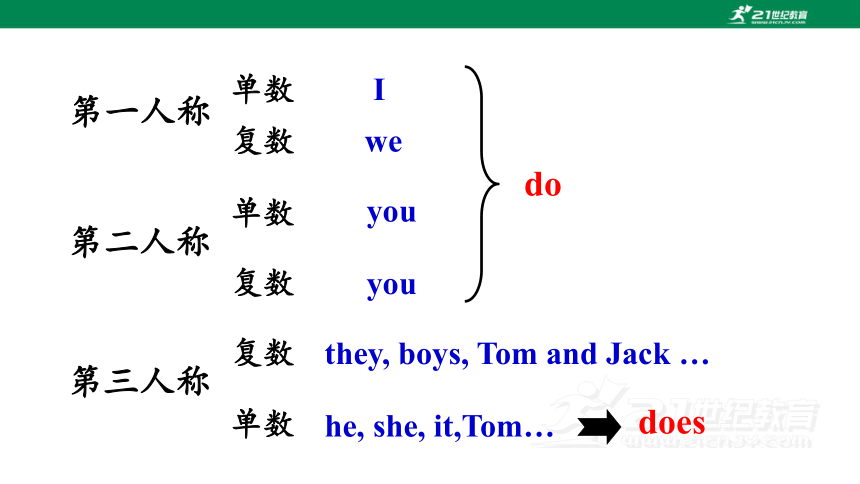
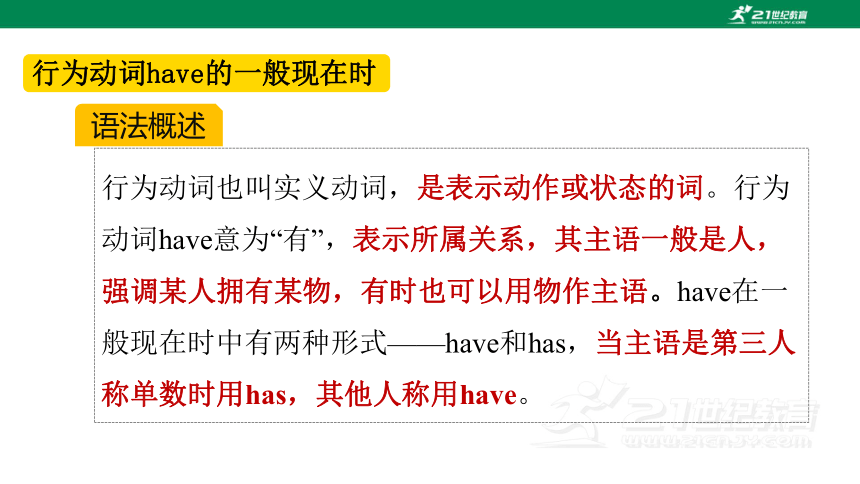
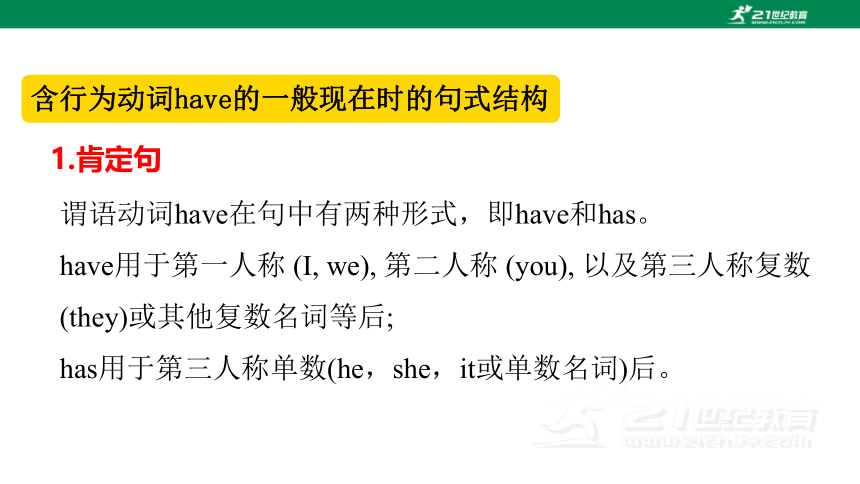
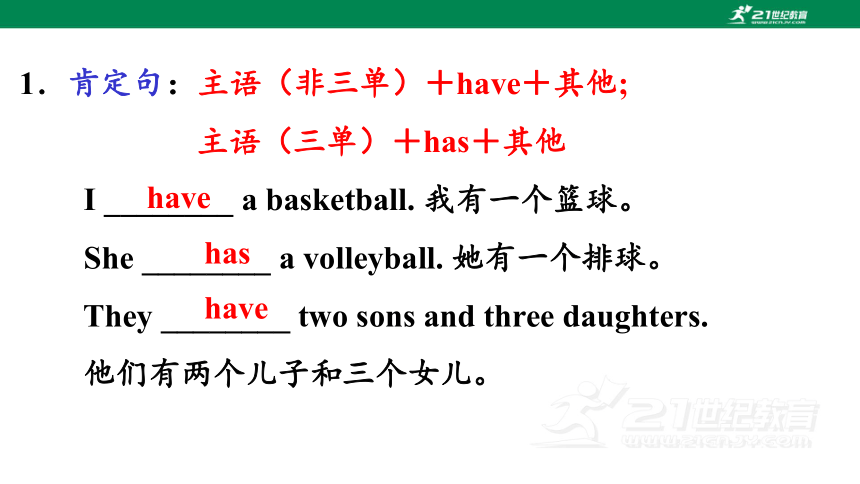
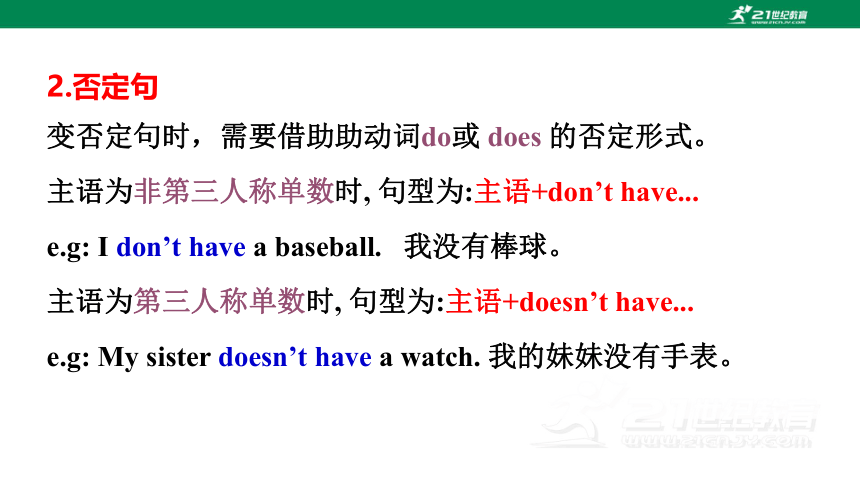
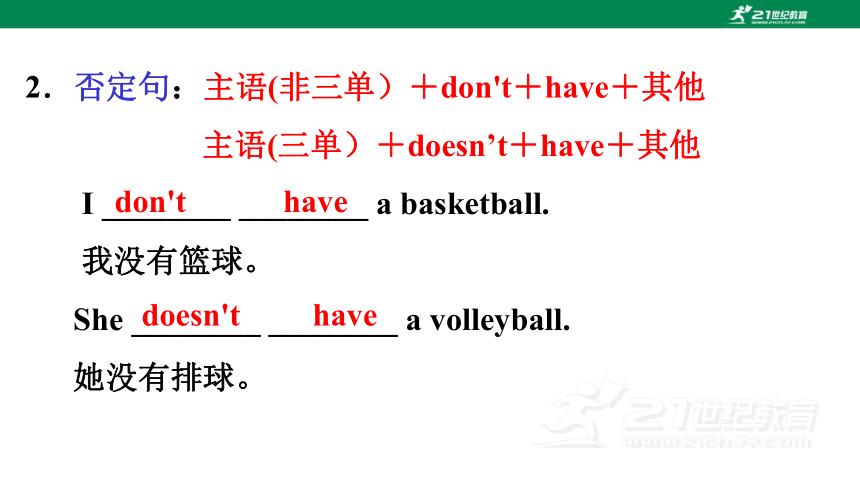
文档简介
(共40张PPT)
Unit 5 Do you have a soccer ball
人教版七年级上 册
Section A (GF-3c)
Learning objectives
Key words & phrases:
great; play; sound
Key sentences:
1. —Do you have a baseball —Yes, I do./No, I don’t.
2. —Does she have a tennis ball —Yes, she does./No, she doesn’t.
3.—Well, let’s play basketball.
—That sounds good.
To learn to use have to talk about ownership.
Review
A: ______ Alice_____a _____________
B: Yes, she does.
A: ______ you _____ a _________
B: Yes, I do.
Does
has
volleyball
ping-pong ball
Do
have
A: ______ she _____a _____________
B: No, she doesn’t.
Does
has
ping-pong bat
A: ______ Jack_____ a_________
B: Yes, _________.
A: ____ they _____ _________
B: No,___________.
Does
has
baseball
he does
Do
have
tennis balls
they don’t
A: ______ he _____ a______________
B: No, _________.
Does
has
baseball bat
he doesn’t
Grammar Focus
don’t=do not doesn’t=does not
Grammar
助动词do
1.第一、第二人称单复数, 以及第三人称复数作主语时, 用do构成一般疑问句, 回答用do或don’t。
2.第三人称单数作主语时, 用does构成一般疑问句, 回答用does或doesn’t。
3.don’t 相当于 do not, doesn’t 相当于 does not。在口语中常用这类缩略形式。
单数
I
第一人称
第二人称
第三人称
复数
单数
单数
复数
复数
we
you
you
they, boys, Tom and Jack …
he, she, it,Tom…
do
does
行为动词也叫实义动词,是表示动作或状态的词。行为动词have意为“有”,表示所属关系,其主语一般是人,强调某人拥有某物,有时也可以用物作主语。have在一般现在时中有两种形式——have和has,当主语是第三人称单数时用has,其他人称用have。
行为动词have的一般现在时
语法概述
含行为动词have的一般现在时的句式结构
谓语动词have在句中有两种形式,即have和has。
have用于第一人称 (I, we), 第二人称 (you), 以及第三人称复数 (they)或其他复数名词等后;
has用于第三人称单数(he,she,it或单数名词)后。
1.肯定句
1.肯定句:主语(非三单)+have+其他;
主语(三单)+has+其他
I ________ a basketball. 我有一个篮球。
She ________ a volleyball. 她有一个排球。
They ________ two sons and three daughters.
他们有两个儿子和三个女儿。
have
has
have
变否定句时,需要借助助动词do或 does 的否定形式。
主语为非第三人称单数时, 句型为:主语+don’t have...
e.g: I don’t have a baseball. 我没有棒球。
主语为第三人称单数时, 句型为:主语+doesn’t have...
e.g: My sister doesn’t have a watch. 我的妹妹没有手表。
2.否定句
2.否定句:主语(非三单)+don't+have+其他
主语(三单)+doesn’t+have+其他
I ________ ________ a basketball.
我没有篮球。
She ________ ________ a volleyball.
她没有排球。
don't have
doesn't have
变一般疑问句时,也需要借助助动词do或其第三人称单数形式does。
主语为非第三人称单数时,句型为:Do+主语+have...
主语为第三人称单数时,句型为:Does+主语+have...
肯定回答: Yes, 主语+do / does.
否定回答: No, 主语+don’t / doesn’t.
3.一般疑问句
3.一般疑问句:Do+主语(非三单)+have+其他
Does+主语(三单)+have+其他
________ you ________ a basketball
你有篮球吗?
________ she ________ a volleyball
她有排球吗?
Do have
Does have
一、一般现在时的定义:
一般现在时是表示现在的状态或经常、习惯性的动作或主语具备的性格和能力等。
e.g. 1) I'm twelve .
2) I have three ping-pong balls .
3) He often gets up late .
4) He likes beef .
5) She can sing .
一般现在时的运用
二、一般现在时句子的谓语结构
1. be动词
be动词根据主语人称、数的不同,选择am,is或are, am :第一人称单数I后 ;
is :第三人称单数he , she , it...后;
are :第二人称you,第一、三人称复数we , they后
一般疑问句: 将be动词am,is , are提前;
否定句:在be动词am,is或are后加not。
2.实义动词作谓语
1)当句子主语不是第三人称单数形式时,实义动词用原形。
一般疑问句: 在句首加助动词do;
否定句: 在主语后加don’t。
eg: Mr. Zhang’s children eat lunch at school on Monday.
Do Mr. Zhang’s children eat lunch at school on Monday
Mr. Zhang’s children don’t eat lunch at school on Monday.
2)当句子主语是第三人称单数形式时,实义动词用第三人称单数形式。
一般疑问句:在句首加助动词does,同时将谓语动词变回原形;
否定句:在主语后加doesn’t,同时将谓语动词变回原形。
eg: This boy often plays computer games after school.
Does this boy often play computer games after school
This boy doesn’t often play computer games after school.
当主语是第三人称单数时,谓语动词有以下几种变化形式:
a. 一般情况:加-s
eg: like—likes, play—plays
b. 以辅音字母+ y结尾的动词:y变为i再加-es。
eg:study— studies
c. 以s,x,ch,sh或o结尾的单词:加-es。
eg: watch—watches , go—goes
d. 不规则形式。
eg: have—has; be—is
3a
Write each word in the correct place in the chart.
I he they you
we she it Eric
I
he
they
you
we
she
it
Eric
3b
Fill in the blanks with do or does. Then practice the
conversations with your partner.
A: you have a baseball
B: Yes, I .
A: Great! I have a bat. Let’s play!
Conversation 1
Do
do
A: _______ John have a soccer ball
B: No, he _______.
A: _______ he have a ping-pong bat
B: Yes, he _______. I think he has a ping-pong ball, too.
A: Hmm…let’s ask.
Conversation 2
Does
doesn’t
Does
does
A: _____ your friends have a basketball
B: Yes, they ______ . They have two basketballs.
A: Well, let’s play basketball.
B: That sounds good.
Conversation 3
Do
do
主语+系动词+表语
那听起来不错。
3c
Remember the things in Bob’s room. Then close your books and ask and answer questions with a partner.
A: Does Bob have a soccer ball
B: Yes, he does.
Practice the conversations with your partner.
1. A: Do you have a baseball
B: Yes, I do.
A: Great! I have a bat. Let’s play.
Pair work
2. A: Does John have a soccer ball
B: No, he doesn’t.
A: Does he have a ping-pong bat
B: Yes, he does. I think he has a ping-pong
ball, too.
A: Hmm … let’s ask.
3. A: Do your friends have a basketball
B: Yes, they do. They have two
basketballs.
A: Well, let’s play basketball.
B: That sounds good.
Language points
1. Great! I have a bat. (教材P27 3b)
great adj. 美妙的;伟大的
great独立成句,常用于口语中,表示说话人的喜悦之情,通常意为“太好了”。
Lu Xun is a great writer. 鲁迅是一位伟大的作家。
—I get a ticket to the show. 我得到了一张演出的票。
—Great! 太棒了!
Language points
2. Well, let’s play basketball. (教材P27 3b)
play v.参加(比赛或运动); 玩耍
1) play在此处是及物动词,后接表示球类运动的名词时,play 与球类运动名词之间不加冠词。
2) play作动词还可意为 “玩耍”,play with sb./sth.表示“和某人一起玩/玩……”。
3) play作动词,还可意为“演奏;弹奏” ,后接表示乐器的名词时,乐器名词前要加定冠词the。
Language points
He often plays volleyball after school. 他放学后经常打排球。
I often play with Tom. We usually play with a ball. 我经常和汤姆玩。我们通常玩球。
She can play the piano. 她会弹钢琴。
Language points
3. That sounds good. (教材P27 3b)
sound v.听起来好像
sound在此处作连系动词, 也是感观动词, 后常接形容词作表语。
That sounds interesting. 那听起来很有趣。
常见的感观动词:
根据句意及汉语提示完成句子,每空一词。
1. Do you have a ________(棒球)?
2. Nick ______(有)a new ping-pong bat.
3. We _______(有)a volleyball.
4. That _______(听起来)great.
5. Let’s _______ ___________(打篮球)with Mike.
baseball
has
have
sounds
play basketball
Exercises
6. Let’s _______ (去) to the teachers’ room.
7. Don’t be _____ (迟到) again, Sun Wei.
8. Ms Sun is a _______ (伟大的) teacher.
9. My sister always ______ (玩耍) with
our lovely cat.
10. There are (有) two new __________ (排球) on the desk.
great
plays
volleyballs
late
go
单项选择。
1. — _______ you have a volleyball
— No, I _____. But my sister ____ a new one.
A. Do; don’t; have
B. Do; don’t; has
C. Does; doesn’t; have
D. Does; doesn’t; has
B
2. Hurry up (快点) , Mary! We’re _______!
A. late B. great C. good D. tidy
3. — Let’s _______. — OK.
A. to play basketball
B. to play the basketball
C. play basketball
D. play the basketball
A
C
4. — _______ Anna _______ a ping-pong bat
— Yes, she _______.
A. Do; have; do B. Does; have; does
C. Do; have; has D. Does; have; has
5. — Listen! The song ______ beautiful!
— Yes. It’s great!
A. hears B. listens
C. listens to D. sounds
D
B
三、按要求完成下列各题。
1. They have a basketball.(变否定句)
___________________________________
2. Lily has a ping-pong ball.(变一般疑问句)
___________________________________
3. Do they have a volleyball (作否定回答)
___________________________________
They don’t have a basketball.
Does Lily have a ping-pong ball
No, they don’t.
Homework
1.Review the new words and expressions in this period.
2. Do the exercises in students’ book.
谢谢
21世纪教育网(www.21cnjy.com)
中小学教育资源网站
兼职招聘:
https://www.21cnjy.com/recruitment/home/admin
Unit 5 Do you have a soccer ball
人教版七年级上 册
Section A (GF-3c)
Learning objectives
Key words & phrases:
great; play; sound
Key sentences:
1. —Do you have a baseball —Yes, I do./No, I don’t.
2. —Does she have a tennis ball —Yes, she does./No, she doesn’t.
3.—Well, let’s play basketball.
—That sounds good.
To learn to use have to talk about ownership.
Review
A: ______ Alice_____a _____________
B: Yes, she does.
A: ______ you _____ a _________
B: Yes, I do.
Does
has
volleyball
ping-pong ball
Do
have
A: ______ she _____a _____________
B: No, she doesn’t.
Does
has
ping-pong bat
A: ______ Jack_____ a_________
B: Yes, _________.
A: ____ they _____ _________
B: No,___________.
Does
has
baseball
he does
Do
have
tennis balls
they don’t
A: ______ he _____ a______________
B: No, _________.
Does
has
baseball bat
he doesn’t
Grammar Focus
don’t=do not doesn’t=does not
Grammar
助动词do
1.第一、第二人称单复数, 以及第三人称复数作主语时, 用do构成一般疑问句, 回答用do或don’t。
2.第三人称单数作主语时, 用does构成一般疑问句, 回答用does或doesn’t。
3.don’t 相当于 do not, doesn’t 相当于 does not。在口语中常用这类缩略形式。
单数
I
第一人称
第二人称
第三人称
复数
单数
单数
复数
复数
we
you
you
they, boys, Tom and Jack …
he, she, it,Tom…
do
does
行为动词也叫实义动词,是表示动作或状态的词。行为动词have意为“有”,表示所属关系,其主语一般是人,强调某人拥有某物,有时也可以用物作主语。have在一般现在时中有两种形式——have和has,当主语是第三人称单数时用has,其他人称用have。
行为动词have的一般现在时
语法概述
含行为动词have的一般现在时的句式结构
谓语动词have在句中有两种形式,即have和has。
have用于第一人称 (I, we), 第二人称 (you), 以及第三人称复数 (they)或其他复数名词等后;
has用于第三人称单数(he,she,it或单数名词)后。
1.肯定句
1.肯定句:主语(非三单)+have+其他;
主语(三单)+has+其他
I ________ a basketball. 我有一个篮球。
She ________ a volleyball. 她有一个排球。
They ________ two sons and three daughters.
他们有两个儿子和三个女儿。
have
has
have
变否定句时,需要借助助动词do或 does 的否定形式。
主语为非第三人称单数时, 句型为:主语+don’t have...
e.g: I don’t have a baseball. 我没有棒球。
主语为第三人称单数时, 句型为:主语+doesn’t have...
e.g: My sister doesn’t have a watch. 我的妹妹没有手表。
2.否定句
2.否定句:主语(非三单)+don't+have+其他
主语(三单)+doesn’t+have+其他
I ________ ________ a basketball.
我没有篮球。
She ________ ________ a volleyball.
她没有排球。
don't have
doesn't have
变一般疑问句时,也需要借助助动词do或其第三人称单数形式does。
主语为非第三人称单数时,句型为:Do+主语+have...
主语为第三人称单数时,句型为:Does+主语+have...
肯定回答: Yes, 主语+do / does.
否定回答: No, 主语+don’t / doesn’t.
3.一般疑问句
3.一般疑问句:Do+主语(非三单)+have+其他
Does+主语(三单)+have+其他
________ you ________ a basketball
你有篮球吗?
________ she ________ a volleyball
她有排球吗?
Do have
Does have
一、一般现在时的定义:
一般现在时是表示现在的状态或经常、习惯性的动作或主语具备的性格和能力等。
e.g. 1) I'm twelve .
2) I have three ping-pong balls .
3) He often gets up late .
4) He likes beef .
5) She can sing .
一般现在时的运用
二、一般现在时句子的谓语结构
1. be动词
be动词根据主语人称、数的不同,选择am,is或are, am :第一人称单数I后 ;
is :第三人称单数he , she , it...后;
are :第二人称you,第一、三人称复数we , they后
一般疑问句: 将be动词am,is , are提前;
否定句:在be动词am,is或are后加not。
2.实义动词作谓语
1)当句子主语不是第三人称单数形式时,实义动词用原形。
一般疑问句: 在句首加助动词do;
否定句: 在主语后加don’t。
eg: Mr. Zhang’s children eat lunch at school on Monday.
Do Mr. Zhang’s children eat lunch at school on Monday
Mr. Zhang’s children don’t eat lunch at school on Monday.
2)当句子主语是第三人称单数形式时,实义动词用第三人称单数形式。
一般疑问句:在句首加助动词does,同时将谓语动词变回原形;
否定句:在主语后加doesn’t,同时将谓语动词变回原形。
eg: This boy often plays computer games after school.
Does this boy often play computer games after school
This boy doesn’t often play computer games after school.
当主语是第三人称单数时,谓语动词有以下几种变化形式:
a. 一般情况:加-s
eg: like—likes, play—plays
b. 以辅音字母+ y结尾的动词:y变为i再加-es。
eg:study— studies
c. 以s,x,ch,sh或o结尾的单词:加-es。
eg: watch—watches , go—goes
d. 不规则形式。
eg: have—has; be—is
3a
Write each word in the correct place in the chart.
I he they you
we she it Eric
I
he
they
you
we
she
it
Eric
3b
Fill in the blanks with do or does. Then practice the
conversations with your partner.
A: you have a baseball
B: Yes, I .
A: Great! I have a bat. Let’s play!
Conversation 1
Do
do
A: _______ John have a soccer ball
B: No, he _______.
A: _______ he have a ping-pong bat
B: Yes, he _______. I think he has a ping-pong ball, too.
A: Hmm…let’s ask.
Conversation 2
Does
doesn’t
Does
does
A: _____ your friends have a basketball
B: Yes, they ______ . They have two basketballs.
A: Well, let’s play basketball.
B: That sounds good.
Conversation 3
Do
do
主语+系动词+表语
那听起来不错。
3c
Remember the things in Bob’s room. Then close your books and ask and answer questions with a partner.
A: Does Bob have a soccer ball
B: Yes, he does.
Practice the conversations with your partner.
1. A: Do you have a baseball
B: Yes, I do.
A: Great! I have a bat. Let’s play.
Pair work
2. A: Does John have a soccer ball
B: No, he doesn’t.
A: Does he have a ping-pong bat
B: Yes, he does. I think he has a ping-pong
ball, too.
A: Hmm … let’s ask.
3. A: Do your friends have a basketball
B: Yes, they do. They have two
basketballs.
A: Well, let’s play basketball.
B: That sounds good.
Language points
1. Great! I have a bat. (教材P27 3b)
great adj. 美妙的;伟大的
great独立成句,常用于口语中,表示说话人的喜悦之情,通常意为“太好了”。
Lu Xun is a great writer. 鲁迅是一位伟大的作家。
—I get a ticket to the show. 我得到了一张演出的票。
—Great! 太棒了!
Language points
2. Well, let’s play basketball. (教材P27 3b)
play v.参加(比赛或运动); 玩耍
1) play在此处是及物动词,后接表示球类运动的名词时,play 与球类运动名词之间不加冠词。
2) play作动词还可意为 “玩耍”,play with sb./sth.表示“和某人一起玩/玩……”。
3) play作动词,还可意为“演奏;弹奏” ,后接表示乐器的名词时,乐器名词前要加定冠词the。
Language points
He often plays volleyball after school. 他放学后经常打排球。
I often play with Tom. We usually play with a ball. 我经常和汤姆玩。我们通常玩球。
She can play the piano. 她会弹钢琴。
Language points
3. That sounds good. (教材P27 3b)
sound v.听起来好像
sound在此处作连系动词, 也是感观动词, 后常接形容词作表语。
That sounds interesting. 那听起来很有趣。
常见的感观动词:
根据句意及汉语提示完成句子,每空一词。
1. Do you have a ________(棒球)?
2. Nick ______(有)a new ping-pong bat.
3. We _______(有)a volleyball.
4. That _______(听起来)great.
5. Let’s _______ ___________(打篮球)with Mike.
baseball
has
have
sounds
play basketball
Exercises
6. Let’s _______ (去) to the teachers’ room.
7. Don’t be _____ (迟到) again, Sun Wei.
8. Ms Sun is a _______ (伟大的) teacher.
9. My sister always ______ (玩耍) with
our lovely cat.
10. There are (有) two new __________ (排球) on the desk.
great
plays
volleyballs
late
go
单项选择。
1. — _______ you have a volleyball
— No, I _____. But my sister ____ a new one.
A. Do; don’t; have
B. Do; don’t; has
C. Does; doesn’t; have
D. Does; doesn’t; has
B
2. Hurry up (快点) , Mary! We’re _______!
A. late B. great C. good D. tidy
3. — Let’s _______. — OK.
A. to play basketball
B. to play the basketball
C. play basketball
D. play the basketball
A
C
4. — _______ Anna _______ a ping-pong bat
— Yes, she _______.
A. Do; have; do B. Does; have; does
C. Do; have; has D. Does; have; has
5. — Listen! The song ______ beautiful!
— Yes. It’s great!
A. hears B. listens
C. listens to D. sounds
D
B
三、按要求完成下列各题。
1. They have a basketball.(变否定句)
___________________________________
2. Lily has a ping-pong ball.(变一般疑问句)
___________________________________
3. Do they have a volleyball (作否定回答)
___________________________________
They don’t have a basketball.
Does Lily have a ping-pong ball
No, they don’t.
Homework
1.Review the new words and expressions in this period.
2. Do the exercises in students’ book.
谢谢
21世纪教育网(www.21cnjy.com)
中小学教育资源网站
兼职招聘:
https://www.21cnjy.com/recruitment/home/admin
同课章节目录
- starters 预备篇(2012秋审查)
- Unit 1 Good morning !
- Unit 2 What’s this in English?
- Unit 3 What color is it ?
- Unit 1 My name's Gina.
- Section A
- Section B
- Unit 2 This is my sister.
- Section A
- Section B
- Unit 3 Is this your pencil?
- Section A
- Section B
- Unit 4 Where's my schoolbag?
- Section A
- Section B
- Unit 5 Do you have a soccer ball?
- Section A
- Section B
- Unit 6 Do you like bananas?
- Section A
- Section B
- Unit 7 How much are these socks?
- Section A
- Section B
- Unit 8 When is your birthday?
- Section A
- Section B
- Unit 9 My favorite subject is science.
- Section A
- Section B
